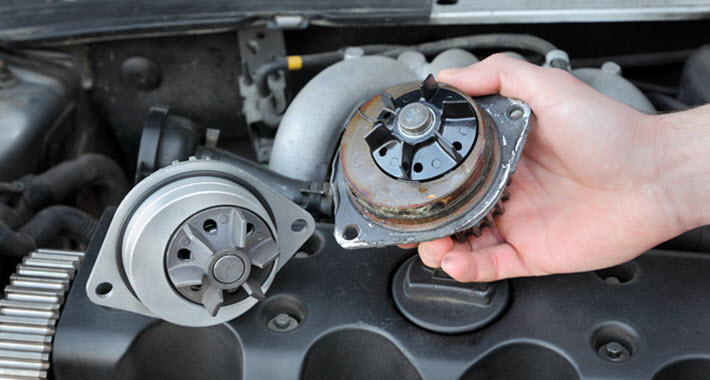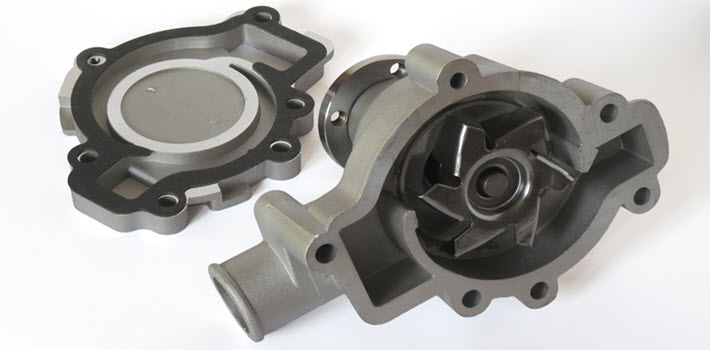Jaguar is a British car manufacturer known for their sleek, safe, and stylish vehicles. First introduced in 1935 across the United Kingdom, the car quickly became a favorite for luxury lovers worldwide. With such a wide selection of vehicles, from convertibles to coupes, they have worked hard to ensure there is a model for everyone.
Even the best car needs servicing and proper care. While all cars require routine maintenance, such as oil changes and tire rotations, some cars are notorious for having certain parts wear out or break at certain points in their lifespans. For Jaguars, one of these issues is water pump failure.
Signs of a Failing Water Pump
Before your water pump quits outright, it will give several signs that something is wrong. However, unless you’re a mechanic, you may not know what these indicators mean. It is important to know the symptoms your Jaguar will exhibit before it’s too late to fix. Some of the common signs of a failing water pump include:
- leaking coolant
- high-pitched whining in your engine
- rust buildup around the water pump
- overheated engine
Causes of a Failing Water Pump
There are several reasons your water pump may fail. If you suspect any of these causes are responsible for your coolant leak or other signs of failure, be sure to bring it up with your mechanic immediately.
Deposit Buildup
One of the main reasons behind water pump failure is mineral buildup inside your water pump. This buildup occurs when non-compatible or contaminated coolant mixtures are used inside your water pump, which is why it’s so important you follow the manufacturer’s specifications. These mineral deposits can block the coolant or cause rust to build up.
Corrosion or Rust Around the Water Pump
Water and condensation can cause your water pump to rust over several years, as can an improperly sealed cap. Eventually, this rust can eat a hole through the metal of the water pump, thereby causing leaks and coolant flow issues. If you notice rust on your water pump, the only way to fix the issue is to have it replaced immediately.
Loose Water Pump Pulley
If you notice a whining sound in the front of your engine, this may be due to a loose water pump pulley. This noise will increase as you accelerate and quiet as you slow down, as it’s caused by the belt that circulates throughout the engine, which is related to the loose pulley.
How to Address a Failed Water Pump
Typically, a Jaguar’s water pump will last between 60,000 to 90,000 miles, after which it will need to be replaced. Frequently, your Jaguar’s timing belt will need to be replaced at or around the same time, as the parts often wear out together.
The best thing you can do to extend the longevity of your water pump is to drive your vehicle responsibly and keep on top of the recommended maintenance schedule. Additionally, using manufacturer-recommended coolant and checking your engine for any signs of rust or damage between visits to the mechanic can help you catch potential problems early.
Keeping your vehicle clean and in tip-top shape may not prevent all damage, but it will minimize the effects and allow you to catch issues before the damage is irreparable.
Unfortunately, no car part is built to last forever, and the same applies to water pumps. Once your water pump fails for good, the best course of action is to bring your vehicle to a certified mechanic as soon as you notice an issue.

Dell’s Service Center of Green Bay Will Help!
Jaguars are impressive vehicles built for performance and style. They’re designed to run at top condition, but only if they’re kept in top shape. If you suspect that there is an issue with your Jaguar’s water pump, it’s crucial that you bring your baby into Dell’s Service Center of Green Bay, Manitowoc, and Sturgeon Bay, WI.
Our mechanics have been servicing Jaguars for almost 50 years. Each of our specialists is passionate about European vehicles and maintains top certifications and training to ensure your vehicle is treated with the respect and care it deserves. We look forward to meeting you and helping you care for your car.

